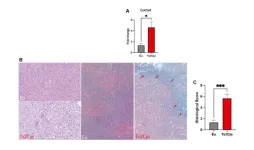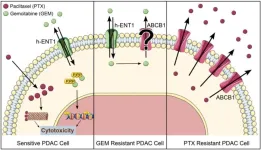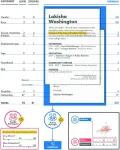(Press-News.org) Toronto, ON – In a groundbreaking effort to mitigate the risks associated with muscle-building dietary supplement use among adolescents and young adults, a comprehensive set of guidelines has been introduced to assist healthcare professionals. These guidelines, published in the Journal of Adolescent Health, focus on assessment and harm reduction strategies to better support young individuals engaged in the use of these readily available supplements.
Muscle-building dietary supplements, such as whey protein and creatine monohydrate, are commonly used by adolescents and young adults, particularly boys and young men, and are intended to enhance muscle mass, strength, and athletic performance. Despite their popularity, there has been a significant gap in guidance for health and mental health care professionals on how to assess and manage potential risks associated with their use. The new guidance aims to bridge this gap by providing detailed recommendations on assessment, nutritional evaluation, behavioral assessment, physical and mental health monitoring, harm reduction, and steroid use assessment.
“Given the risks involved, we highly recommend that all health and mental health care professionals ask their adolescent and young adult clients about muscle-building supplement use,” say Kyle T. Ganson, PhD, MSW, assistant professor and lead author of the guidance. “This includes assessing the type, frequency, dose, and method of supplement use, as well as understanding the client’s motivations and knowledge about the supplements.”
The authors advocate for comprehensive biopsychosocial assessments when muscle-building supplement use is reported by adolescent and young adult clients. “It is critical to assess for other behaviors aimed at altering appearance, weight, shape, strength, and performance, as well as body image issues and the presence of any eating disorder, body dysmorphic disorder, or muscle dysmorphia,” says Ganson. “Identifying adverse effects on physical, psychological, and social health, and ongoing monitoring, should be part of routine practice.”
A harm reduction approach is emphasized throughout the guidelines. “This approach includes open communication, understanding motivations, and psychoeducation,” says Ganson. “The goal is to provide strategies to reduce negative effects associated with the use of muscle-building supplements, while acknowledging that abstinence may not be a realistic goal for all clients.”
Lastly, the guidelines address the need to assess for potential or current use of anabolic-androgenic steroids (AAS), given the connection between muscle-building supplement use and future AAS use. Healthcare professionals are encouraged to provide education on the potential harms of AAS and further strategies to reduce risks.
END
New guidance for healthcare professionals to address muscle-building supplement use
Healthcare professionals are encouraged to assess for muscle-building supplement use among all adolescent and young adult clients
2024-07-10
ELSE PRESS RELEASES FROM THIS DATE:
It is possible to predict cognitive decline in Alzheimer's disease
2024-07-10
Amsterdam UMC's Alzheimer Centre has developed a prediction model that can predict cognitive decline in patients with mild cognitive impairment or mild dementia due to Alzheimer's disease. The next step is developing an app that uses this prediction model, which would represent an important step towards personalised forecasts for patients. The study is published today in the journal Neurology.
After people have been diagnosed with Alzheimer's, their first question is often: "What can I expect now?". This question is difficult ...
Can we predict how fast cognitive decline will occur with early Alzheimer’s?
2024-07-10
MINNEAPOLIS – A new study looks at predicting how quickly people with early Alzheimer’s disease will experience cognitive decline. The study is published in the July 10, 2024, online issue of Neurology®, the medical journal of the American Academy of Neurology. It also looked at how the new drugs recently approved for the disease may reduce decline.
“The rate of cognitive decline varies greatly from person to person, and people are very interested in what to expect from the disease in themselves or their loved ones, so better prediction models are urgently needed,” said study author Pieter J. van der Veere, M.D., of Amsterdam ...
New Consumer Food insights from Purdue explores consumer attitudes toward U.S. farm bill
2024-07-10
The general public has limited knowledge of the U.S. farm bill that politicians are debating on Capitol Hill, according to the June 2024 Consumer Food Insights (CFI) Report.
The survey-based report out of Purdue University’s Center for Food Demand Analysis and Sustainability (CFDAS) assesses food spending, consumer satisfaction and values, support of agricultural and food policies, and trust in information sources. Purdue experts conducted and evaluated the survey, which included 1,200 consumers across the U.S
“Around one-third ...
Lion with nine lives breaks record with longest swim in predator-infested waters
2024-07-10
A record-breaking swim by two lion brothers across a predator-infested African river has been documented in a study co-led by Griffith University and Northern Arizona University.
Dr Alexander Braczkowski, from Griffith’s Centre for Planetary Health and Food Security, led a team that filmed a two-male lion coalition crossing the Kazinga Channel in Uganda at night, using high-definition heat detection cameras on drones. The work was done under the supervision of the Uganda Wildlife Authority.
One half of the lion brother duo was a 10-year-old ...
Pumpkin disease not evolving, could make a difference for management
2024-07-10
URBANA, Ill. -- The pathogen that causes bacterial spot is very good at what it does. Forming small lesions on the rinds of pumpkins, melons, cucumbers, and other cucurbits, it mars the fruits’ appearance and ushers in secondary pathogens that lead to rot and severe yield loss. The bacterium, Xanthomonas cucurbitae, is so successful that it has had no reason to evolve through time or space. That’s according to new University of Illinois Urbana-Champaign research characterizing ...
Aging exacerbates oxidative stress and liver fibrosis in an animal model of Down Syndrome
2024-07-10
“[...] our results put the basis for the use of antioxidants supplementation in Down Syndrome patients to prevent liver-associated pathologies.”
BUFFALO, NY- July 10, 2024 – A new research paper was published in Aging (listed by MEDLINE/PubMed as "Aging (Albany NY)" and "Aging-US" by Web of Science) Volume 16, Issue 12, entitled, “Aging exacerbates oxidative stress and liver fibrosis in an animal model of Down Syndrome.”
Down Syndrome (DS) is a common genetic disorder characterized by an extra copy of chromosome 21, leading to dysregulation of various metabolic pathways. Oxidative stress in DS is associated ...
Targeting ABC transporters in PDAC – past, present, or future?
2024-07-10
“[...] it is crucial for the future application of ABC transporter inhibitors [...] to develop a stratification protocol [...] to identify those PDAC patients who are most likely to benefit from chemosensitization induced by these inhibitors.”
BUFFALO, NY- July 10, 2024 – A new editorial paper was published in Oncotarget's Volume 15 on June 20, 2024, entitled, “Targeting ABC transporters in PDAC – past, present, or future?”
In this new editorial, Cecilia Bergonzini, Elisa Giovannetti and Erik ...
Machine learning models could enable earlier identification of at-risk children, aiding social workers and potentially improving outcomes, per Danish study of more than 100,000 children
2024-07-10
Machine learning models could enable earlier identification of at-risk children, aiding social workers and potentially improving outcomes, per Danish study of more than 100,000 children
###
Article URL: https://journals.plos.org/plosone/article?id=10.1371/journal.pone.0305974
Article Title: Predictive risk modeling for child maltreatment detection and enhanced decision-making: Evidence from Danish administrative data
Author Countries: Denmark, France
Funding: Funding for this project was ...
Holiday season already? Anticipation might make time seem to fly
2024-07-10
Christmas or Ramadan might seem to come around more quickly each year, for people who pay more attention to time, are more forgetful of plans, and love a good holiday. A research team led by Ruth Ogden of Liverpool John Moores University, UK, and Saad Sabet Alatrany of Imam Ja'afar Al-Sadiq University, Iraq, published these findings in the open-access journal PLOS ONE on July 10, 2024. They suggest this could mean that someone’s experience of time is shaped not only by what they’ve done, but what is left to do.
“Christmas seems to come quicker each year,” is a staple of small talk. But the ...
Perceived warmth, competence predict callback decisions in meta-analysis of hiring experiments
2024-07-10
Perceived warmth and competence predict the influence of race, gender and age on callback decisions, suggesting social perceptions might underlie such hiring bias. The meta-analysis of North American correspondence studies is published July 10, 2024 in the open-access journal PLOS ONE by Carina Hausladen from the California Institute of Technology and ETH Zürich, Marcos Gallo from the California Institute of Technology, and colleagues.
In the labor market, applicants from marginalized groups continue to face disparate treatment. To ...
LAST 30 PRESS RELEASES:
Why chronic pain lasts longer in women: Immune cells offer clues
Toxic exposure creates epigenetic disease risk over 20 generations
More time spent on social media linked to steroid use intentions among boys and men
New study suggests a “kick it while it’s down” approach to cancer treatment could improve cure rates
Milken Institute, Ann Theodore Foundation launch new grant to support clinical trial for potential sarcoidosis treatment
New strategies boost effectiveness of CAR-NK therapy against cancer
Study: Adolescent cannabis use linked to doubling risk of psychotic and bipolar disorders
Invisible harms: drug-related deaths spike after hurricanes and tropical storms
Adolescent cannabis use and risk of psychotic, bipolar, depressive, and anxiety disorders
Anxiety, depression, and care barriers in adults with intellectual and developmental disabilities
Study: Anxiety, gloom often accompany intellectual deficits
Massage Therapy Foundation awards $300,000 research grant to the University of Denver
Gastrointestinal toxicity linked to targeted cancer therapies in the United States
Countdown to the Bial Award in Biomedicine 2025
Blood marker from dementia research could help track aging across the animal world
Birds change altitude to survive epic journeys across deserts and seas
Here's why you need a backup for the map on your phone
ACS Central Science | Researchers from Insilico Medicine and Lilly publish foundational vision for fully autonomous “Prompt-to-Drug” pharmaceutical R&D
Increasing the number of coronary interventions in patients with acute myocardial infarction does not appear to reduce death rates
Tackling uplift resistance in tall infrastructures sustainably
Novel wireless origami-inspired smart cushioning device for safer logistics
Hidden genetic mismatch, which triples the risk of a life-threatening immune attack after cord blood transplantation
Physical function is a crucial predictor of survival after heart failure
Striking genomic architecture discovered in embryonic reproductive cells before they start developing into sperm and eggs
Screening improves early detection of colorectal cancer
New data on spontaneous coronary artery dissection (SCAD) – a common cause of heart attacks in younger women
How root growth is stimulated by nitrate: Researchers decipher signalling chain
Scientists reveal our best- and worst-case scenarios for a warming Antarctica
Cleaner fish show intelligence typical of mammals
AABNet and partners launch landmark guide on the conservation of African livestock genetic resources and sustainable breeding strategies
[Press-News.org] New guidance for healthcare professionals to address muscle-building supplement useHealthcare professionals are encouraged to assess for muscle-building supplement use among all adolescent and young adult clients







